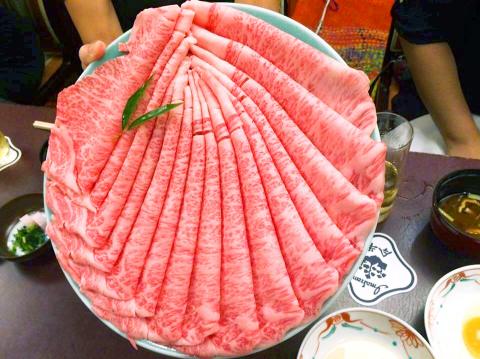Taiwan is to lift a 14-year ban on beef imports from Japan, Sweden and the Netherlands, Ministry of Health and Welfare officials said on Friday.
The ministry’s Food and Drug Agency (FDA) on July 17 posted a draft of regulations governing beef imports from the three nations, adding that in the 60-day notification period, which ended on Friday, the agency collected public opinions regarding time, evaluation procedures and requirements for the planned lifting of the ban.
According to the draft, beef imported from the three nations should not include the brain, head, eyes, trigeminal nerve, spine, spinal cord or the dorsal root ganglion — all body parts that are susceptible to bovine spongiform encephalopathy, commonly known as mad cow disease.

Photo: Wang Yi-hung, Taipei Times
Beef cattle have to be raised for more than 100 days in their country of origin, while Japanese and Swedish cattle cannot be more than 30 months old and Dutch cattle cannot be more than 12 months old, the draft added.
FDA section chief Wu Tsung-hsi (吳宗熹) said these import standards are the same as those set for US and Canadian beef imports, adding that importers’ certification and lists of qualified processing factories are also to be collected.
Wu said the agency would announce formal import regulations after a review and the lifting of the ban is expected to take effect pending promulgation by the Executive Yuan.
About 94 percent of the nation’s beef is imported from the US, Canada, Australia, New Zealand and Paraguay, government data showed.
US beef imports total 109,522 tonnes per year and Australia imports 43,099 tonnes of beef per year, while Taiwan produces about 6,800 tonnes of beef annually, the data showed.
Many restaurants said they welcome the lifting of the ban, especially on Japanese wagyu, which is popular among gourmets because of its even fat distribution and taste.
FIH Regent Group (FIH, 晶華國際酒店集團) general manager Simon Wu (吳偉正) said wagyu is a lure for its customers and it will be added to the menu when it is available.
Hotel Royal Group (老爺大酒店集團) chief executive Winston Shen (沈方正) said the group would introduce the product based on each hotel’s needs.
Kanpai Group (乾杯集團) also expressed its intention to introduce the product to its restaurants.
Additional reporting by Peng Wang-hsin

Tropical Storm Gaemi strengthened into a typhoon at 2pm yesterday, and could make landfall in Yilan County tomorrow, the Central Weather Administration (CWA) said yesterday. The agency was scheduled to issue a sea warning at 11:30pm yesterday, and could issue a land warning later today. Gaemi was moving north-northwest at 4kph, carrying maximum sustained winds near its center of up to 118.8kph and gusts of 154.8kph. The circumference is forecast to reach eastern Taiwan tomorrow morning, with the center making landfall in Yilan County later that night before departing from the north coast, CWA weather forecaster Kuan Shin-ping (官欣平) said yesterday. Uncertainty remains and

SEA WARNING LIKELY: The storm, named Gaemi, could become a moderate typhoon on Wednesday or Thursday, with the Taipei City Government preparing for flooding A tropical depression east of the Philippines developed into a tropical storm named Gaemi at 2pm yesterday, and was moving toward eastern Taiwan, the Central Weather Administration (CWA) said. Gaemi could begin to affect Taiwan proper on Tuesday, lasting until Friday, and could develop into a moderate typhoon on Wednesday or Thursday, it said. A sea warning for Gaemi could be issued as early as Tuesday morning, it added. Gaemi, the third tropical storm in the Pacific Ocean this typhoon season, is projected to begin moving northwest today, and be closest to Taiwan on Wednesday or Thursday, the agency said. Today, there would likely

DISRUPTIONS: The high-speed rail is to operate as normal, while several airlines either canceled flights or announced early departures or late arrivals Schools and offices in 15 cities and counties are to be closed today due to Typhoon Gaemi, local governments announced last night. The 15 are: Taipei, New Taipei City, Taoyuan, Tainan, Keelung, Hsinchu and Kaohsiung, as well as Yilan, Hualien, Hsinchu, Miaoli, Chiayi, Pingtung, Penghu and Lienchiang counties. People should brace for torrential rainfall brought by the storm, with its center forecast to make landfall on the east coast between tonight and tomorrow morning, the Central Weather Administration (CWA) said. The agency issued a sea warning for the typhoon at 11:30pm on Monday, followed by a land warning at 11:30am yesterday. As of

CASUALTY: A 70-year-old woman was killed by a falling tree in Kaohsiung as the premier warned all government agencies to remain on high alert for the next 24 hours Schools and offices nationwide are to be closed for a second day today as Typhoon Gaemi crosses over the nation, bringing torrential rain and whipping winds. Gaemi was forecast to make landfall late last night. From Tuesday night, its outer band brought substantial rainfall and strong winds to the nation. As of 6:15pm last night, the typhoon’s center was 20km southeast of Hualien County, Central Weather Administration (CWA) data showed. It was moving at 19kph and had a radius of 250km. As of 3pm yesterday, one woman had died, while 58 people were injured, the Central Emergency Operation Center said. The 70-year-old